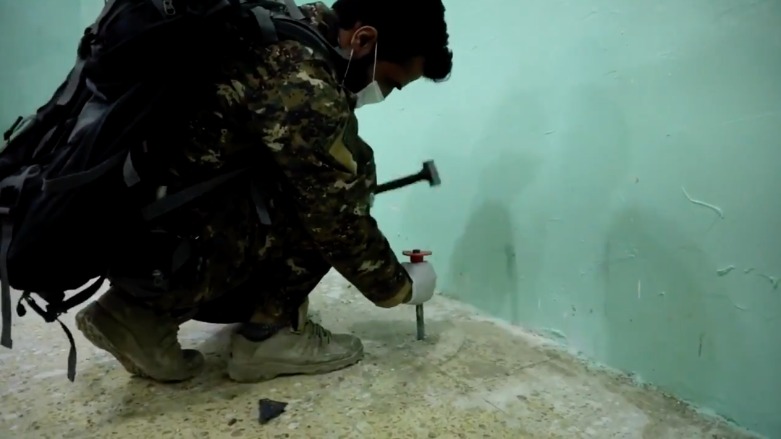Kurdish-led forces update security at northern Syrian prison where ISIS fighters attempted escapes

ERBIL (Kurdistan 24) – The Syrian Democratic Forces (SDF) announced on Thursday that, with support of the US-led Coalition, they have updated security procedures at a prison in Syria’s northern Hasakah province to prevent future escape attempts by detainees accused of crimes committed as part of the ISIS extremist group.
The changes, which included significant structural repairs and the implementation of new coronavirus-related health measures, were carried out between Friday and Wednesday.
Between 7th-12th of this May, the competent agencies, backed by our forces’ counter-terrorism units and with effective support by the international coalition forces against Daesh, conducted reorganizations and a number of security repairs in Hasaka prison (1-3)
— Farhad Shami (@farhad_shami) May 13, 2021
"During this period, the competent agencies and our units inspected the construction of the prison, reorganized the records of detainees, repaired security techniques within the dormitories, and took further appropriate security measures," wrote the SDF’s General Command in a tweet.
The prison has seen multiple escape attempts by ISIS-affiliated detainees, including one last year where they temporarily gained control of part of the facility where thousands of inmates are housed.
Read More: ISIS detainees attempt second jailbreak at SDF-held prison in northeast Syria
"As part of the health measures to combat Covid-19, our forces’ medical teams have checked up the health of detainees, detected their diseases, provided the necessary treatments, and carried out a large-scale sterilization campaign within the prison dormitories," the statement added further.
The Kurdish-led forces said they completed the changes amid attempts by ISIS prisoners to sabotage "surveillance devices in the prison dormitories with the aim of implementing mass escapes."
Security forces concluded a 6-days security check and maintenance work in Hasaka prison hosting IS-linked individuals in NE Syria between May 7-12. SDF CT units and health workers, with active support by @CJTFOIR, took part in efforts of reorganization and registering process. pic.twitter.com/wsgHpkVMJL
— Office of Media&Information (@SDFinformation) May 13, 2021
The SDF also confiscated a large number of sharp objects that could be used as weapons from the prisoners that were fashioned out of various materials available in the detainees’ living quarters.
"In parallel, our units have been able to uncover holes in the walls of dormitories connecting the dormitories of Daesh (ISIS) mercenaries with those where the cubs of the terrorist organization are kept. The holes were created by mercenaries in order to infiltrate and retrain them for extremist ideology, but our units have taken the necessary measures to prevent this."
The SDF leadership also renewed its earlier call on the international community to form an international tribunal in northern Syria to put foreign ISIS fighters on trial. However, so far there has been no support from the international community to set up such a trial.
After the overhaul was carried out, Col. Wayne Marotto, Spokesman for the US-led Coalition to Defeat ISIS, told Kurdistan 24, "Detainees are the greatest risk to the enduring defeat of Daesh."
Without "international engagement,” he said, “they pose a risk for Daesh regeneration."
On May 4, a Pentagon Inspector General report covering the first quarter of 2021 (January 1–March 31, 2021) said that the US-led coalition continues to provide training and equipment to help increase the SDF’s capacity to manage detention facilities holding approximately 10,000 ISIS fighters.
Moreover, the US Congress approved $710 million for the Counter-ISIS Train and Equip Fund (CTEF), a portion of which is used by the Coalition to fund "construction and infrastructure repair to ensure the humane and secure detention of ISIS fighters (in Syria)."
"The SDF and the Coalition recognize that the population of ISIS-linked prisoners is a gap in the security in northeast Syria," Nicholas Heras, a Senior Analyst at the Washington, DC-based Newlines Institute, told Kurdistan 24.
"These prisons are an opportunity for ISIS to network and reorganize, drawing from ISIS's two-decade long experience in Iraq,” he explained. “The goal of this Coalition support is to provide the SDF with the means to service the prisoners better to improve their living conditions, as well as to improve SDF methods to surveil and survey ISIS networks in these prisons."
Editing by John J. Catherine